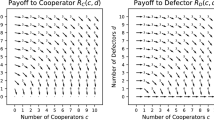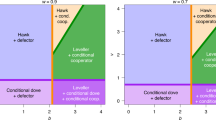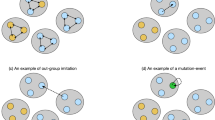Abstract
Issues regarding foraging in groups have been addressed and researched in a range of domains. Questions arise regarding the benefits to the group as a whole and the cost placed upon individual group members. In this paper, we model the foraging problem as a common resource pool problem and evolve populations in a range of scenarios. In these simulations, agents (group members) forage for food, may contribute to a common pool resource and may benefit from this group resource. We present and discuss results illustrating the scenarios under which agents evolve to behave for the common good of the group and its effect on the survival and the fitness of the population.
Similar content being viewed by others
References
Andrews R, Belknap R (1986) Bioenergetic benefits of huddling in deer mice (peromyscus maniculatus). Comp Biochem Physiol A 85: 775–778
Broom M, Ruxton GD (2003) Evolutionarily stable kleptoparasitism: consequences of different prey types. Behav Ecol 14(1): 23–33
Creel S (1997) Cooperative hunting and group size: assumptions and currencies. Anim Behav 54: 1319–1324
Creel S, Creel N (1995) Communal hunting and pack size in African wild dogs. Anim Behav 50: 1325–1339
Dieckmann U, Law R, Metz J (eds) (2000) Games on grids. Cambridge University Press
Gurven M (2004) Reciprocal altruism and food sharing decisions among Hiwi and Ache huntergatherers. Behav Ecol Sociobiol 56(4): 366–380
Hardin G (1968) The tragedy of the commons. Science 162: 1243–1248
Hauert C (2006) Spatial effects in social dilemmas. J Theor Biol 240(4): 627–636
Lindgren K, Nordahl MG (1994) Evolutionary dynamics of spatial games. Phisica D 75: 292–309
Ramchurn S, Huynh D, Jennings N (2004) Trust in multi-agent systems. Knowl Eng Rev 19(1): 1–25
Riolo RL (1997) The effects of tag-mediated selection of partners in evolving populations playing the iterated prisoner’s dilemma. Tech. rep., Santa Fe Institute Working Paper 97-02-016
Ruxton G (1993) Foraging in flock-nonspatial models may neglect important costs. Ecol Modell 82: 235–253
Schmitt R, Strand S (1982) Cooperative foraging by yellowtail (seriola lalandei) on two species of fish. Copeia 3: 714–717
Treherne J, Foster W (1980) Group transmission of predator avoidance behaviour in a marine insect. Anim Behav 28: 1119–1122
Turner G, Pitcher T (1986) Attack abatement: a model of group protection by combined avoidance and dilution. Am Nat 35: 228–240
Valone T (1989) Group foraging, public information and patch estimation. Oikos 56: 357–363
Wilkinson GS (1984) Reciprocal food sharing in the vampire bat. Nature 308: 181–184
Author information
Authors and Affiliations
Corresponding author
Rights and permissions
About this article
Cite this article
Curran, D., O’Riordan, C. & Sorensen, H. The evolution of donators in a common-pool resource problem. Artif Intell Rev 27, 245–256 (2007). https://doi.org/10.1007/s10462-008-9077-2
Received:
Accepted:
Published:
Issue Date:
DOI: https://doi.org/10.1007/s10462-008-9077-2




